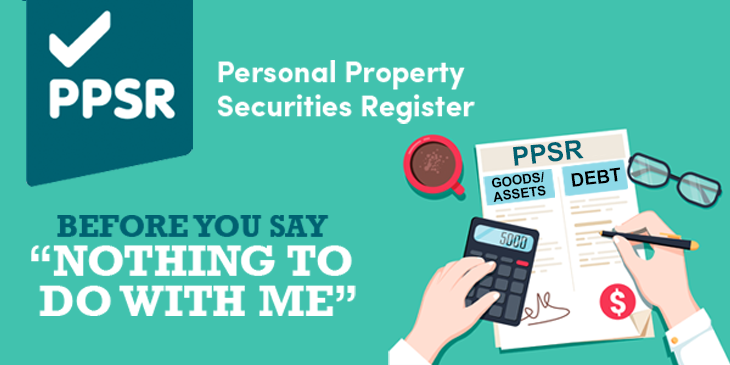Do you:
Sell goods on retention of title terms?
Hire, rent or lease out goods?
Buy or sell valuable second-hand goods?
Want to raise finance for your business using your stock or other assets as collateral?
As many of our clients would know from a previous AAG Newsletter on this topic, in 2012 a new law was introduced that established a new national register – the Personal Property Security Register (PPSR) – and it affects anyone who answered ‘yes’ to any of the above questions. That’s a significant proportion of Australian businesses.
As a small business owner selling goods, making a registration shows anyone who searches the register that you’re claiming an interest in the goods you’re selling on retention of title terms, or have consigned to someone else to sell on your behalf. This interest means the goods secure the debt that someone owes you. The registration protects your interest in the goods in the event your customer defaults on their payments to you or go broke.
If you don’t make a registration on those goods or assets and your customer goes broke before they have fully paid you, your goods may be sold to pay secured creditors first. If you are not registered, you will be an unsecured creditor in an insolvency and may not recover much, if anything, of what you’re owed. Registering as early as possible gives you the best chance of being first in line over other creditors. It also helps you to protect your interest even if the goods are sold on, mixed or installed onto other goods.
Similarly, when you buy goods, searching the register lets you know if the valuable goods you’re interested in buying are being used as security for a debt by someone else. The register won’t tell you the value of the debt, but it does let you know who it’s owed to, so you can find out more information.
For example, someone may try to sell you used goods, such as a car, truck or piece of machinery, without telling you they still have finance owing on it. And if they stop making payments on their loan there’s a very real chance the finance company can turn up on your doorstep and take those goods away, without paying you a cent for your loss.
For $2 you can check that goods you want to buy are likely to be free of financed debt, and safe from repossession.
Take care – PPSR seven year registrations started to expire on 30 January 2019.
The Personal Property Securities Register (PPSR) hit a significant milestone on 30 January 2019 when it turned seven years old.
The Australian Financial Security Authority (AFSA) has recently warned that initial seven-year registrations started to expire on 30 January 2019. Once a registration lapses, it cannot be extended. Only current registrations can be amended or renewed.
If your registration lapses, then your security interest no longer exists and you will become an unsecured creditor.
The duration terms of registrations are:
- Seven years or less
- More than seven years but less than 25
- No stated end time
We recommend that if you have registered a security interest on the PPSR that you review it from time to time and if necessary, amend it to ensure that the correct details are recorded and that it doesn’t lapse if any monies are still owing to you.
You can simply do this by:
- Logging into the PPSR and requesting a free ‘registrations due to expire’ report.
www.ppsr.gov.au/how-get-your-registrations-due-expire-report - This will list all of your registrations that are due to expire in a specific date range.
- Review and amend if necessary, all the details in the registration; making sure your correct ACN or ABN, company name and current address are recorded.
- Review and amend if necessary, the description of the goods or security.
- If you need to extend your registration, choose a new expiry date.
For more details on the PPSR and a Flow Chart to help you to decide if it applies to your personal situation, click here to see our PPSR Fact Sheet.
Important information and disclaimer
This publication has been prepared by AustAsia Group, including AustAsia Legal Pty Ltd (ACN 123 160 476).
AustAsia Legal Pty Ltd – Liability limited by a scheme approved under Professional Standards Legislation.
Any advice in this publication is of a general nature only and has not been tailored to your personal circumstances. Accordingly, reliance should not be placed on the information contained in this document as the basis for making any financial investment, insurance or other decision. Please seek personal advice prior to acting on this information.
Information in this publication is accurate as at the date of writing, 22 March 2019. Some of the information may have been provided to us by third parties. Whilst it is believed the information is accurate and reliable, the accuracy of that information is not guaranteed in any way.
Opinions constitute our judgement at the time of issue and are subject to change. Neither the Licensee nor any member of AustAsia Group, nor their employees or directors give any warranty of accuracy, nor accept any responsibility, for any errors or omissions in this document.
Any general tax information provided in this publication is intended as a guide only and is based on our general understanding of taxation laws. It is not intended to be a substitute for specialised taxation advice or an assessment of your liabilities, obligations or claim entitlements that arise, or could arise, under taxation law, and we recommend you consult with a registered tax agent.




